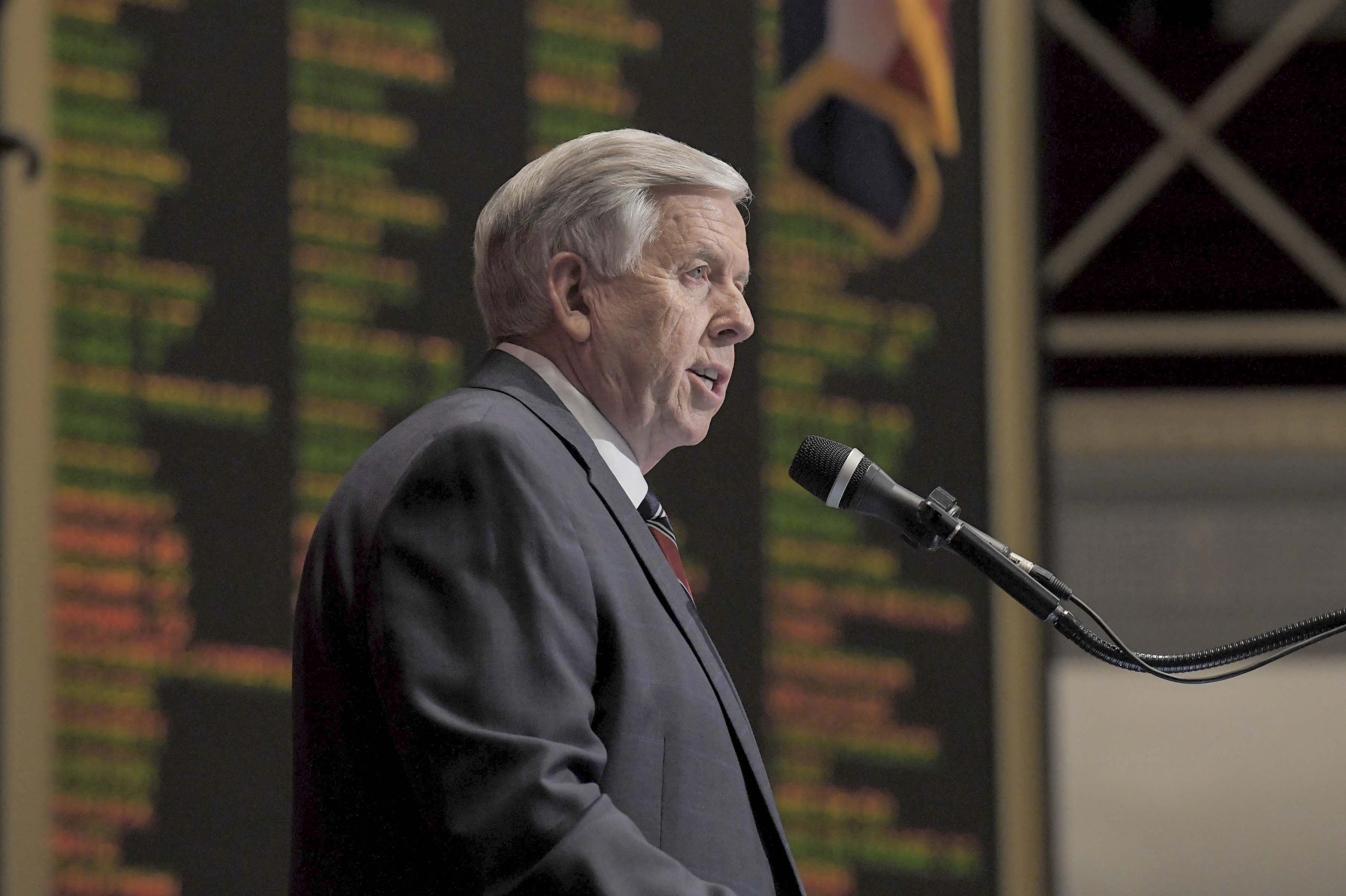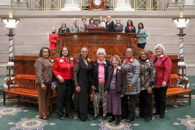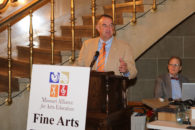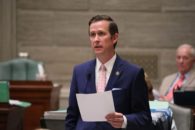JEFFERSON CITY, Mo. — Dubbed “historical and transformational” by Cabinet officials, Gov. Mike Parson’s recommended budget includes multiple one-time projects, investments in state workers, and higher education grants.
Parson unveiled his budget proposals — which include both general revenue and federal American Rescue Place Act (ARPA) funds — during his State of the State address Wednesday afternoon. Parson touted Missouri’s economy as strong enough for the state to make “fundamental investments” which he said was due in part to its response to the COVID-19 pandemic.
Parson’s budget includes $46 billion of general revenue and $2.8 billion of ARPA funds.
The governor earmarked childcare as a major investment needed to strengthen Missouri’s workforce. His budget included a $722 million investment into childcare to help maintain operations and improve the quality of care.
“The future of Missouri — and Missouri families — relies upon children being healthy, safe, and ready to learn. We must continue to invest in our children and their education,” Parson said in his address.
According to budget officials, Parson’s proposals include funding for several one-time projects. But he also called on the legislature to set aside $281 million, 2.5 percent of the net general revenue collections from last year, into a cash operating expense fund should Missouri’s economy falter.
“By setting aside an additional 2.5 percent of general revenue, we will achieve financial stability when the rainy days come. This is the responsible thing to do, this is the conservative thing to do, this is the right thing to do,” Parson said.
His budget includes a pay increase for state employees as well as investments into the Missouri State Employee Retirement System (MOSERS). He also asked the legislature to increase the base new teacher salary pay to $38,000, noting Missouri ranks last in the nation for teacher salaries.
“As we continue our recovery this year, we share the governor’s focus on preparing our state’s workforce and investing in our vital connections and infrastructure — two foundations of our economy,” said Daniel P. Mehan, president and CEO of the Missouri Chamber of Commerce and Industry. “This includes repairing our transportation system, building out broadband, continuing Missouri’s successful Fast Track program, and making efforts to expand access to career technical education and innovative apprenticeship opportunities.”
Here’s a deeper look at some of Parson’s budget recommendations.
State employee investments
The governor has proposed increasing state employee pay by about 5.5 percent — ensuring workers make at least $15 per hour. The suggestion is billed as a way to bolster the state’s workforce and retain employees.
His budget includes $288 million for the state employee increase as well as a $500 million investment into the MOSERS fund in addition to annual contributions. The latter is expected to increase the funding ratio of the pension system to 63.2 percent.
Additionally, Parson’s budget includes $11.6 million for a state employee retirement savings incentive. The initiative will add an additional benefit up to $25 each month for a matching contribution into the MOSERS Deferred Compensation Program.
Following the governor’s State of the State address, Democratic Rep. Rasheen Aldridge called on the governor to increase the state’s minimum wage to at least $15 per hour across the board.
“I believe our state needs to go a step further and take this policy statewide and into the private sector as well,” Aldridge, a Fight for 15 activist, said. “Throughout the pandemic, that work was called essential and necessary, but people have yet to see wages that reflect the integral role they play in our economy.”
“I call on Gov. Parson to be brave and ensure these wages are available to all working Missourians, not just those who work for the state,” he said.
Health care
Parson’s budget proposal includes $420,000 for a new youth behavioral health liaison program that will involve schools, the juvenile justice system, and state agencies. The program is a measure to aid at-risk youths, according to the Governor’s Office.
Additionally, Parson has earmarked $2.5 million for Missouri’s prescription drug monitoring program (PDMP).
To combat a current waitlist, the governor’s budget includes $4.2 million for the state’s autism centers. The increase in funding is expected to more than double the capacity at the six centers.
Parson also wants the state to set aside $400 million of federal funds for the state’s response to COVID-19, for things such as personal protective equipment, staffing needs, testing, and vaccinations.
Law enforcement
The governor recommended at least $1 million for new scholarships for individuals who attend a law enforcement academy and commit to at least three years of service in the state.
In addition, the governor said the state needs to set aside $28.5 million to establish the new 988 hotline that serves those experiencing a mental health crisis. The funding will increase capacity at the regional crisis call centers and dozens of mobile teams throughout Missouri.
The proposal also recommends $4.4 million to modernize the Missouri State Highway Patrol’s 911 dispatch centers to equip data sharing among agencies.
“In Missouri, we defend law enforcement, not defund them,” Parson said.
His budget recommended setting aside $4.5 million of federal funds for rape kit testing.
Infrastructure
Parson’s general revenue and ARPA budget proposals contain a bevy of transportation and infrastructure projects — and budget officials said more federal money is expected to come from the massive infrastructure package recently signed into law.
Parson has already announced a massive $400 million investment into broadband, but his budget proposal breaks down how that federal money will be used.
Most of the money, $250 million, would be used for broadband infrastructure with grants through public and private partnerships with providers. Another $30 million is earmarked for the state’s 100 cell towers campaign — an effort to refurbish and construct cell towers to decrease coverage gaps in rural and urban areas alike. Other funds would be used to establish rural telehealth connections, launch a digital literacy campaign, and assist with broadband affordability.
Parson’s general revenue budget includes $56.2 million in additional broadband grants for communities, providers, and regions.
As for transportation needs, Parson’s budget earmarked $75 million for the continuation of the state’s cost-share program for public roads and bridges. The project matches up to 50 percent of certain construction contract costs. Additionally, the budget includes $100 million for improvements to low-volume roads.
“These are the hardest routes to fund and are important to local communities, especially in rural Missouri,” Parson said. “This investment will help us free up additional funding for much-needed projects in suburban and urban areas, leaving no region behind.”
The budget also includes $12.9 million for public transit needs.
Federal funds are recommended for investment into the Office of Broadband Development’s geographic information system (GIS) coverage mapping effort, improvement of wifi at state parks, and effort to boost every county’s 911 GIS standards.
Parson’s budget includes nearly $412 million of federal money to improve Missouri’s water, wastewater, and stormwater infrastructure projects.
Small businesses
The governor’s budget includes $94.9 million in capital funding for small businesses. That is in addition to $25 million for grants to small businesses to help beef up the workforce, improve technology, and address cash flow challenges from supply chain disruptions. The grant program was recommended after success was seen during similar efforts with CARES funding.
“Starting a new business is difficult. But trying to launch a new business the last couple of years has really been a challenge,” National Federation of Independent Business (NFIB) Missouri Director Brad Jones said. “NFIB welcomes any support the administration can provide our budding entrepreneurs.”
Education
Parson received thunderous applause from lawmakers when he asked them to increase the baseline for new teacher salaries to $38,000. He also asked the legislature to permanently establish Fast Track, a financial aid program that helps adults receive certificates and degrees in high-need areas.
Parson’s budget includes $51.6 million for core funding for the state’s community colleges, four-year higher education institutions, and the State Technical College of Missouri.
With nearly $469 million of ARPA funding, Missouri can fund the No. 1 capital improvement project at public higher education institutions in the state. Projects include the NextGen Precision Health center at the University of Missouri – Columbia and a Health Sciences & Crisis Center at Lincoln University.
Additionally, $10 million of federal funds is earmarked to extend the MoExcels program for private, non-profit schools that train individuals for high-demand jobs.
Editor’s Note: Gov. Mike Parson will be the featured guest on “This Week in Missouri Politics” Sunday to discuss his State of the State address.

Kaitlyn Schallhorn was the editor in chief of The Missouri Times from 2020-2022. She joined the newspaper in early 2019 after working as a reporter for Fox News in New York City.
Throughout her career, Kaitlyn has covered political campaigns across the U.S., including the 2016 presidential election, and humanitarian aid efforts in Africa and the Middle East.
She is a native of Missouri who studied journalism at Winthrop University in South Carolina. She is also an alumna of the National Journalism Center in Washington, D.C.
Contact Kaitlyn at kaitlyn@themissouritimes.com.































